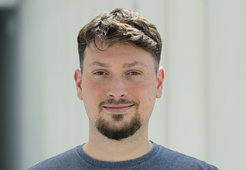Fascinated by the ability to control and observe electronic motion
Meet our new doctoral candidate Arber Selimi!

We’re excited to introduce you to another one of our newest IMPRS-APS members: Arber Selimi, who not only has a passion for ultrafast spectroscopy, but also for traveling the world. Arber has recently started his doctoral studies in the experimental section of the “Attosecond science” group under the supervision of Nobel laureate Prof. Ferenc Krausz and Dr. Nicholas Karpowicz at the Max Planck Institute of Quantum Optics.
What’s your main research focus for your PhD?
The focus of my research is to create extremely short and extremely broadband pulses that can reach ultraviolet wavelengths and attosecond durations, via soliton self-compression. These pulses are then utilized for metrology. The goal is to investigate charge carrier dynamics in solids and potentially biological samples with unprecedented resolution.
What excites you most about this field?
Being able to control and observe electronic motion and its various applications for the progress in technology and medicine fascinates me the most.
What and where did you study?
I completed my Bachelor’s and Master’s degree in Physics at the Ludwig-Maximillians-Universität in Munich and decided to do my Master’s thesis at the Max Planck Institute of Quantum Optics under the supervision of Prof. Ferenc Krausz and Dr. Nicholas Karpowicz. While doing my project on laser development, I found my passion for ultrafast spectroscopy.
What attracted you to the IMPRS-APS program?
The collaborative culture that fosters interdisciplinary knowledge transfer from the field of photonics to laser technology and quantum chemistry. It is a unique opportunity to connect with other young scientists and get to know their work. Additionally, seminars and conferences can further provide a platform to grow as a scientist and individual.
What skills do you want to develop during your PhD?
I believe the most valuable skills one can develop during a PhD are not scientific, they are rather about personal evolution and shaping your own future. Therefore, I would choose resilience and independence in what you do, as I believe this is the universal key to success.
What is something you enjoy outside of research?
On one side I really enjoy movies, music and chess to relax whereas on the other side I also really like traveling all over the world to explore new places and new cultures. I am planning to continue that much more in the future.
Thank you for the interview and welcome to IMPRS-APS!



